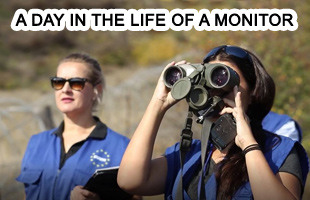Ambassador Hansjörg Haber, Head of the European Union Monitoring Mission in Georgia, (EUMM) participated in the 4th International Conference on the European Neighbourhood Policy (ENP) Action Plan (AP) implementation in Georgia that took place in Tbilisi today 10 February under the title Georgia’s European Way, Conflict Resolution, Democratic and Economic Reforms.
The high level Conference is organized every six months to asses the evolution of the Georgia ENP AP by the Office of the State Minister of European and Euro-Atlantic Integration. Speakers included representatives from international organizations, such as the European Council, European Commission, EU Presidency, and Delegations from EU Member States and the OSCE.
From the Georgian Administration, representatives included the Georgian Prime Minister, nine Georgian Ministers, and other high level officials from the Parliament of Georgia, the Court, Office of the Public Defender and the Provisional Administration of South Ossetia and Government of the Autonomous Republic of Abkhazia. Georgian Officials underlined that in light of the Russia-Georgia war Georgia’s European integration priorities have acquired almost existential importance. The EU is perceived as a guarantor of peace, democracy, development, stability, territorial integrity and human rights protection. The Georgian government welcomed the decisions taken by the European Council to deploy the EU Monitoring Mission (EUMM) in Georgia. Georgia fully supports the activities of the EUMM.
In the Conflict Resolution Session during the afternoon, Mr. Hansjörg Haber, Head of the EUMM, spoke about the relations that the EUMM has developed with the different Ministries in Georgia, about the EUMM mandate, the achievements of the EUMM, the implementation of the six point agreement, the fast deployment of the Mission and the withdrawal of the Russian Forces and the fact that many displaced Georgian people could return to their homes within the adjacent areas and close to the Administrative Boundary Line (ABL). He added that “in January a Memorandum of Understanding between the EUMM and the Ministry of Defence was signed, as a unilateral move, that increases the security of Georgia as a whole. This means that Georgia is not able to assemble a force able to escalate the situation close to the ABL”, “we have also begun to negotiate a conflict prevention mechanism which we intend to lead in concrete terms to close cooperation between the police forces on both sides of the ABL, Abkhazia (ABK) and South Ossetia (SO) together with the Russians, establishing red lines, improving contacts in case of emergencies. This mechanism is now part of the Geneva process , and on 17 and 18 February we will see what comes of it. The prospect is that we are going to have a period of uncertain times, we do not know what will happen with the mandates of UNOMIG and the OSCE, and the Geneva talks, however it will be premature to say that at the end of February everything will be clarified, the situation could be very similar to the one we have now” Mr. Haber said.
“Finally some food for thought, the question that the journalists always ask me, when will you have access to SO and ABK? we are an unarmed, civilian mission, we are knocking on the doors, and we clearly say that our mandate is throughout all Georgia…we think that safety and security along the ABL should be through cooperation of all sides…the “de facto governments” should be interested, if they are not this tells something about their perception of security and their responsibility. If we could cooperate with them we would be a neutral force in the ground without political considerations. What the EU is doing for Georgia is important in three areas: the no recognition of the facto areas, the Geneva talks, and the EUMM.
“It is hard to underestimate the element of non recognition of the de facto areas by the 27 Member States of the EU. The element of status, of respect of international law is there in the floor. Georgia has to implement an active reunification policy on their own, developing incentives for all to live together as a better alternative, this debate has to be there, including also the civil society, NGOs, think tanks and also the government. Maybe it is still too soon, only six months after the end of the conflict.”
Many questions were addressed to Mr. Haber after the Conference, on the non fulfilment of the Six point agreement, on the occupation of SO and ABK. Mr. Haber answered on the positive aspect of the Russian withdrawal on 8 October. The fact that the EUMM focuses on security on the ground whilst status issues are addressed elsewhere.
Asked by journalists about the detention of OSCE observers today, Mr. Haber answered “that they have been released is good news, we need to know the whole story before commenting further, these people are experts, they have been dealing with this territory for very long and know perfectly their way and I am sure they know every inch of the ABL by heart.
It is for the OSCE to pronounce on the incident, but certainly we are in the same line of business as the OSCE and we have professional solidarity with them”.
The high level Conference is organized every six months to asses the evolution of the Georgia ENP AP by the Office of the State Minister of European and Euro-Atlantic Integration. Speakers included representatives from international organizations, such as the European Council, European Commission, EU Presidency, and Delegations from EU Member States and the OSCE.
From the Georgian Administration, representatives included the Georgian Prime Minister, nine Georgian Ministers, and other high level officials from the Parliament of Georgia, the Court, Office of the Public Defender and the Provisional Administration of South Ossetia and Government of the Autonomous Republic of Abkhazia. Georgian Officials underlined that in light of the Russia-Georgia war Georgia’s European integration priorities have acquired almost existential importance. The EU is perceived as a guarantor of peace, democracy, development, stability, territorial integrity and human rights protection. The Georgian government welcomed the decisions taken by the European Council to deploy the EU Monitoring Mission (EUMM) in Georgia. Georgia fully supports the activities of the EUMM.
In the Conflict Resolution Session during the afternoon, Mr. Hansjörg Haber, Head of the EUMM, spoke about the relations that the EUMM has developed with the different Ministries in Georgia, about the EUMM mandate, the achievements of the EUMM, the implementation of the six point agreement, the fast deployment of the Mission and the withdrawal of the Russian Forces and the fact that many displaced Georgian people could return to their homes within the adjacent areas and close to the Administrative Boundary Line (ABL). He added that “in January a Memorandum of Understanding between the EUMM and the Ministry of Defence was signed, as a unilateral move, that increases the security of Georgia as a whole. This means that Georgia is not able to assemble a force able to escalate the situation close to the ABL”, “we have also begun to negotiate a conflict prevention mechanism which we intend to lead in concrete terms to close cooperation between the police forces on both sides of the ABL, Abkhazia (ABK) and South Ossetia (SO) together with the Russians, establishing red lines, improving contacts in case of emergencies. This mechanism is now part of the Geneva process , and on 17 and 18 February we will see what comes of it. The prospect is that we are going to have a period of uncertain times, we do not know what will happen with the mandates of UNOMIG and the OSCE, and the Geneva talks, however it will be premature to say that at the end of February everything will be clarified, the situation could be very similar to the one we have now” Mr. Haber said.
“Finally some food for thought, the question that the journalists always ask me, when will you have access to SO and ABK? we are an unarmed, civilian mission, we are knocking on the doors, and we clearly say that our mandate is throughout all Georgia…we think that safety and security along the ABL should be through cooperation of all sides…the “de facto governments” should be interested, if they are not this tells something about their perception of security and their responsibility. If we could cooperate with them we would be a neutral force in the ground without political considerations. What the EU is doing for Georgia is important in three areas: the no recognition of the facto areas, the Geneva talks, and the EUMM.
“It is hard to underestimate the element of non recognition of the de facto areas by the 27 Member States of the EU. The element of status, of respect of international law is there in the floor. Georgia has to implement an active reunification policy on their own, developing incentives for all to live together as a better alternative, this debate has to be there, including also the civil society, NGOs, think tanks and also the government. Maybe it is still too soon, only six months after the end of the conflict.”
Many questions were addressed to Mr. Haber after the Conference, on the non fulfilment of the Six point agreement, on the occupation of SO and ABK. Mr. Haber answered on the positive aspect of the Russian withdrawal on 8 October. The fact that the EUMM focuses on security on the ground whilst status issues are addressed elsewhere.
Asked by journalists about the detention of OSCE observers today, Mr. Haber answered “that they have been released is good news, we need to know the whole story before commenting further, these people are experts, they have been dealing with this territory for very long and know perfectly their way and I am sure they know every inch of the ABL by heart.
It is for the OSCE to pronounce on the incident, but certainly we are in the same line of business as the OSCE and we have professional solidarity with them”.



